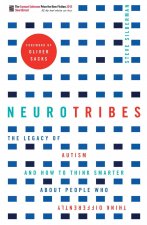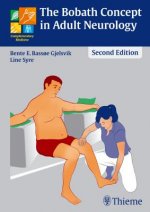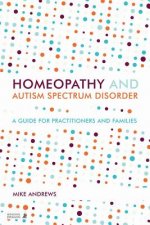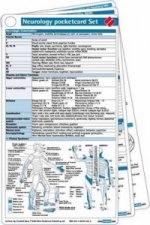
Kód: 01298906
Treatment-Resistant Depression
Autor Siegfried Kasper
Successful management of patients with treatment-resistant depression is going to require a thorough understanding of the biological basis for both the depression and its failure to respond to standard treatments. This book clearl ... celý popis
- Jazyk:
 Angličtina
Angličtina - Vazba: Brožovaná
- Počet stran: 228
Nakladatelství: John Wiley and Sons Ltd, 2013
- Více informací o knize

1398 Kč

Skladem u dodavatele v malém množství
Odesíláme za 14-18 dnů
Potřebujete více kusů?Máte-li zájem o více kusů, prověřte, prosím, nejprve dostupnost titulu na naši zákaznické podpoře.
Přidat mezi přání
Mohlo by se vám také líbit
-

Tattoos
389 Kč -

Visions of Entitlement
3243 Kč -

Mercer Commentary on the New Testament
989 Kč -

Reforme de la Tenure Forestiere
1140 Kč -

Handbook on Rigid 23 Class Airships 1918
826 Kč -

Vom ehelichen Leben und andere Schriften über die Ehe
149 Kč -

Vorlesungen ber Die Theorie Der Polyeder
1977 Kč
Darujte tuto knihu ještě dnes
- Objednejte knihu a zvolte Zaslat jako dárek.
- Obratem obdržíte darovací poukaz na knihu, který můžete ihned předat obdarovanému.
- Knihu zašleme na adresu obdarovaného, o nic se nestaráte.
Více informací o knize Treatment-Resistant Depression
Nákupem získáte 140 bodů
 Anotace knihy
Anotace knihy
Successful management of patients with treatment-resistant depression is going to require a thorough understanding of the biological basis for both the depression and its failure to respond to standard treatments. This book clearly and succinctly summarizes the latest scientific research and its applications in clinical practice.§A first step is a clear definition of what constitutes treatment-resistant depression so that clinical trials and other studies are using common criteria, enabling comparison and meta-analysis of their outcomes. The opening chapter reviews definitions and predictors of originating from different fields and discusses their usefulness in clinical practice and clinical research. The next chapter proposes a new definition, adapting terminology from medicine.§Biological classification requires identification of genetic risk factors: with gene variants accounting for 50% of the variance in the clinical outcomes of antidepressant treatments this is clearly a fruitful area of research. Chapter 3 describes several genes already associated with treatment-resistant depression and, while further work is needed to translate findings into clinical recommendations, predicts that genetic prediction of TRD could became a widespread clinical reality within a few years.§Most patients with TRD will be treated pharmacologically and three chapters review the latest evidence for pharmacological best practice, including switching strategies for antidepressants, the role of antipsychotics and augmentation strategies to complement lithium.§There are two major alternatives to pharmacotherapy: neuromodulation and psychotherapy. The brain intervention chapter summarizes clinical research and experience with electroconvulsive therapy, transcranial magnetic stimulation, vagus nerve stimulation, deep brain stimulation and magnetic seizure therapy. The final chapter reviews the literature pertaining to the effectiveness of various forms of psychotherapy in patients who have not responded to antidepressant pharmacotherapy, revealing that patients who have not responded to one or two trials of antidepressant medication have a 30%-50% chance of responding to a focused psychotherapy. It proposes indications for psychotherapy in TRD and summarizes general therapeutic principles.
 Parametry knihy
Parametry knihy
Zařazení knihy Knihy v angličtině Medicine Clinical & internal medicine Neurology & clinical neurophysiology
1398 Kč
- Plný název: Treatment-Resistant Depression
- Autor: Siegfried Kasper
- Jazyk:
 Angličtina
Angličtina - Vazba: Brožovaná
- Počet stran: 228
- EAN: 9781119952909
- ISBN: 1119952905
- ID: 01298906
- Nakladatelství: John Wiley and Sons Ltd
- Hmotnost: 218 g
- Rozměry: 128 × 200 × 11 mm
- Datum vydání: 22. March 2013
Oblíbené z jiného soudku
-

Stop Autism Now!
539 Kč -

Autistic Brain
487 Kč -

NeuroTribes
464 Kč -

PDA in the Therapy Room
594 Kč -

Early Start for Your Child with Autism
479 Kč -

Female Brain
303 Kč -

You Can Fix Your Brain
623 Kč -

Oxford Handbook of Neurology
1281 Kč -

Netter's Atlas of Neuroscience
1984 Kč -

Women and Girls with Autism Spectrum Disorder
647 Kč -

Aspergirls
425 Kč -

Gut and Psychology Syndrome
596 Kč -

Topical Diagnosis in Neurology
1435 Kč -

The Reason I Jump
290 Kč -

101 Games and Activities for Children With Autism, Asperger's and Sensory Processing Disorders
410 Kč -

Rowan's Primer of EEG
1910 Kč -

Parent's Guide to High-Functioning Autism Spectrum Disorder
512 Kč -

Marriage and Lasting Relationships with Asperger's Syndrome (Autism Spectrum Disorder)
559 Kč -

PEERS (R) for Young Adults
1856 Kč -

Neurological Examination Made Easy
662 Kč -

Bobath Concept in Adult Neurology
2061 Kč -

Dynamical Systems in Neuroscience
1702 Kč -

Neuroanatomy
2493 Kč -

Neuropsychological Assessment
5745 Kč -

Atlas of Electroencephalography -- Volume 2
3827 Kč -

Atlas of Electroencephalography -- Volume 1
3827 Kč -

Spectrum Women
595 Kč -

Homeopathy and Autism Spectrum Disorder
628 Kč -

Standard Electroencephalography in Clinical Psychiatry - A Practical Handbook
1872 Kč -

Neuromuscular Case Studies
5248 Kč -

Geeks, Genes, and the Evolution of Asperger Syndrome
600 Kč -

All Birds Have Anxiety
388 Kč -

Cerebral Small Vessel Disease
4751 Kč -

Neuroscience of Pain, Stress, and Emotion
3232 Kč -

Social Skills Training for Children with Asperger Syndrome and High-Functioning Autism
2654 Kč -

22 Things a Woman with Asperger's Syndrome Wants Her Partner to Know
388 Kč -

Neurology Pocketcard Set
188 Kč -

Polyvagal Theory
1246 Kč -

Complete Guide to Asperger's Syndrome
616 Kč -

22 Things a Woman Must Know If She Loves a Man with Asperger's Syndrome
388 Kč -

Neurofitness
838 Kč -

Mind Diet Cookbook
402 Kč -

In a Different Key
607 Kč -

Practical Approach to Electroencephalography
2619 Kč -

Autism Spectrum Guide to Sexuality and Relationships
526 Kč -

Brainwashing
342 Kč -

Schema Therapy
1522 Kč -

Pretending to be Normal
458 Kč -

Engaging Autism
421 Kč
Osobní odběr Praha, Brno a 12903 dalších
Copyright ©2008-24 nejlevnejsi-knihy.cz Všechna práva vyhrazenaSoukromíCookies


 Vrácení do měsíce
Vrácení do měsíce 571 999 099 (8-15.30h)
571 999 099 (8-15.30h)